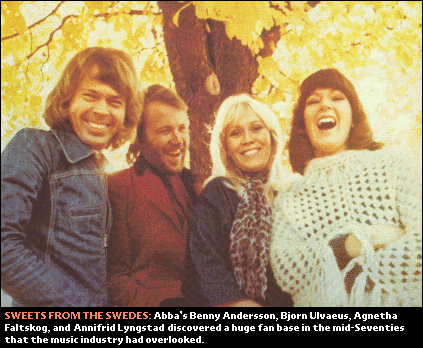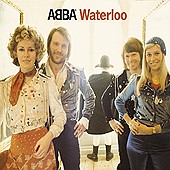- Home
- Introduction, Update Information, Links
- The Super Seventies "Classic 500"
- Readers' Favorite Seventies Albums
- Seventies Single Spotlight
- The Top 100 Seventies Singles
- Favorite Seventies Artists In The News
- Seventies Almanac - Year By Year
- Seventies Singles - Month By Month
- Seventies Albums - Month By Month
- Seventies Daily Music Chronicle
- Seventies Superstars In Their Own Words
- The Super Seventies Archives
- Seventies Trivia Quizzes & Games
- Seventies MIDI Jukebox
- The Super Seventies Bookstore
- The Super Seventies Photo Gallery
- Seventies' Greatest Album Covers
- Popular Seventies Movies & TV
- Seventies Celebrity Portrait Gallery
- Seventies Lyrics Hit Parade
- Top Seventies Artist Music Videos
- Seventies Usenet Music Forums
- Seventies Smiley Calendar
- EXTRA!
- Superseventies.com Facebook Page
- Superseventies.com Reddit Discussions
- The Super Seventies Blog
- Tweet The Seventies
- RockSite InfoBank
- Beatlefan Site
- Thanks For Your Support! / Top Sellers
- Search The Rock Site/ The Web
Abba
Atlantic 3035
Jun. 1974
Billboard: #6

![]() ay what you will about Abba, they did the best job of representing what was good
about mid-'70s pop. Their music might have been as rootless as a Chia Pet but, also like that bizarre animal/plant, it could grow on you. In the mid-'70s, America was already awash with such popular non-rock acts as the Carpenters, Barbra Streisand, Barry Manilow, Anne Murray, and Olivia Newton-John, so why not add a sweet-sounding, exotic band from Sweden? All of the above acts had plainly discernable talent (some more obviously than others), not to mention well-honed and carefully maintained images, which made them the pop phenomena of the mid-'70s. The music these artists created was aimed at a slightly older age group than rock and roll's target audience, so it was geared to reflect the sophisticated tastes and more mature lifestyles that an older audience presumably possessed. An older audience also implied a more conservative demeanor and less musically adventurous tastes. Unfortunately, this also meant that the material, although crisply produced, was deliberately lacking in innovation or controversy. As a result, a cycle developed that stunted the growth of pop music. Abba embraced the homogenized lack of topicality that defined most middle-of-the-road artists but geared its material to a more sprightly audience. The typical teenage rock-and-roll fan and the typical mid-40s housewife might not have cared for Abba, but virtually everybody between these two extremes found something to like. The unprecedented appearance of a Swedish pop group on the American charts notwithstanding, Abba's first American single was catchy enough to become instantly familiar.
ay what you will about Abba, they did the best job of representing what was good
about mid-'70s pop. Their music might have been as rootless as a Chia Pet but, also like that bizarre animal/plant, it could grow on you. In the mid-'70s, America was already awash with such popular non-rock acts as the Carpenters, Barbra Streisand, Barry Manilow, Anne Murray, and Olivia Newton-John, so why not add a sweet-sounding, exotic band from Sweden? All of the above acts had plainly discernable talent (some more obviously than others), not to mention well-honed and carefully maintained images, which made them the pop phenomena of the mid-'70s. The music these artists created was aimed at a slightly older age group than rock and roll's target audience, so it was geared to reflect the sophisticated tastes and more mature lifestyles that an older audience presumably possessed. An older audience also implied a more conservative demeanor and less musically adventurous tastes. Unfortunately, this also meant that the material, although crisply produced, was deliberately lacking in innovation or controversy. As a result, a cycle developed that stunted the growth of pop music. Abba embraced the homogenized lack of topicality that defined most middle-of-the-road artists but geared its material to a more sprightly audience. The typical teenage rock-and-roll fan and the typical mid-40s housewife might not have cared for Abba, but virtually everybody between these two extremes found something to like. The unprecedented appearance of a Swedish pop group on the American charts notwithstanding, Abba's first American single was catchy enough to become instantly familiar.

In addition to reaching #6 in the United States, "Waterloo" climbed to #1 in Sweden, Britain, Norway, Holland, Denmark, and Belgium, selling over five million records worldwide. "Honey Honey," a smooth and happy medium-tempo pop tune, barely cracked the Top 40 in America, peaking at #34 in October 1974, but it became Abba's second million-seller in Europe. Through elaborate lip-synched videotape productions Abba proceeded to become the number-1 group in all the world except the United States, selling zillions of records. Abba's second album, Abba, sold four million copies in Britain before it was released, and the four singles from the album sold over a million each. Their rocker "S.O.S." climbed to #10 in America and sold four million in Europe alone. "I Do, I Do, I Do, I Do, I Do," was an echo of the late Fifties that captured the sound of Connie Francis and sold over two and a half million copies. "Mamma Mia," "So Long," and "Fernando," which sounded like a South American revolutionary folk song, all earned more precious metal for the group. Their Abba's Greatest Hits album repackaged all their million sellers with some of their earlier material and sold over six million copies worldwide in 1976. The Arrival album in 1977 featured three more big hits: Abba's first #1 hit in America, "Dancing Queen" ; the beautiful ballad "Knowing Me, Knowing You"; and "Money, Money, Money."
In 1978 "Take a Chance on Me," with its a cappella opening, was the perfect summer song; and "The Name of the Game," a ballad with a good beat and lush harmonies, was another richly produced hit. Although many rock critics raved over the group's "growth" and "sophistication" of Abba: The Album, which was sorely lacking in upbeat tunes, it also proved the group's least successful venture in America. But Abba was not ready to abandon their commercial sense for good reviews. Benny and Bjorn labored for close to two years in their state-of-the-art recording studio in Stockholm, and their hard work was rewarded when "Does Your Mother Know," a great rocker about jailbait, climbed the singles charts in the summer of 1979. Voulez-Vous marked a return to rock and roll for Abba, with catching tunes like "Kisses of Fire," "If It Wasn't for the Nights," "As Good As New," and the title cut, a searing song about a pick-up at a disco. In September 1979 the group made its long-awaited first concert tour of North America, playing to packed houses. 1981 brought the long-awaited album Super Trooper and a Top 5 hit single in America, a touching ballad about divorce called "The Winner Takes All." By the beginning of the '80s, Abba had secured their place as one of the world's great rock groups with their ability to put a smile on the face of rock and roll.
- Thomas Ryan, American Hit Radio,
Prima Entertainment, 1996.
![]() Reader's Comments
Reader's Comments
No comments so far, be the first to comment .
![]() Main Page
| Additional Singles Intro
| Singles By Month
| Seventies Almanac
| Search The RockSite/The Web
Main Page
| Additional Singles Intro
| Singles By Month
| Seventies Almanac
| Search The RockSite/The Web


